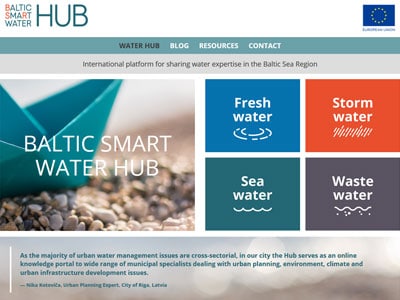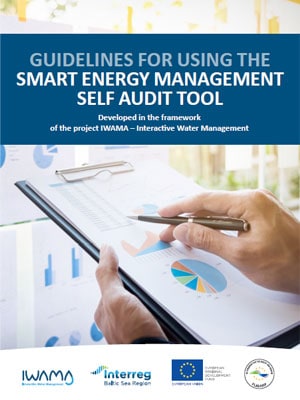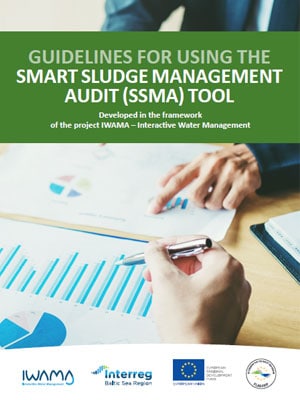IWAMA
Municipal wastewater treatment plants (WWTPs) play an important role in water protection. Efficient and environmentally smart WWTP operations can positively influence the state of the sea and the climate. While purifying domestic and industrial wastewaters, WWTPs remove nutrients (in particular phosphorous and nitrogen) from the water. When returning to the water bodies, nutrients cause eutrophication, which is one of the biggest problems of the Baltic Sea. The Baltic Marine Environment Protection Commission HELCOM monitors the state of the Baltic Sea and frequently issues high level political recommendations that are to ensure a good environmental status of the sea.
The HELCOM recommendations concerning waste water are stricter than the requirements of the EU Urban WWT Directive, demanding lower nutrient concentrations for water leaving waste water treatment plants. That is why WWTPs in different part of the Baltic Sea region are applying different requirements. To be able to reach the HELCOM recommendations, most of the WWTPs still need to improve their nutrient removal methods. Complying with the HELCOM recommendations means also additional operational costs for the WWTPs. However, it is possible, at the same time as applying the HELCOM recommendations, to save costs by smart process optimisation and investments. In order to be able to do so, the owners and operators of waste water treatment plants need tools that they can apply in everyday management and access to information about available technologies and experience with their application.
Budgets
in numbers
-
4.62MillionTotal
-
3.69MillionErdf
-
0.00MillionEni + Russia
-
0.00MillionNorway
Achievements
In the IWAMA project the Union of Baltic Cities teamed up with five research and training institutions, three national waterworks associations and eight operators of waste water treatment plants from five countries to provide tools and knowledge that operators need to improve the the efficiency of waste water management in the Baltic Sea region. They focused on three of the core areas of the municipal waste water treatment sector: energy management, sludge management and capacity development.
Modern technology for waste water treatment plants across the Baltic Sea region
The waste water treatment plants installed state of the art technologies to improve their waste water treatment. Several installations improve the nutrient removal, e.g. a nitrogen component control system in Daugavpils (Latvia), a combined anammox-constructed wetland pilot-plant in Gdańsk (Poland), as well as full-scale sludge humification beds in Türi and Oisu (Estonia) and a reject-water treatment system in Tartu (Estonia). Other installations improved the energy management, e.g. energy-efficient sludge drying in Jūrmala (Latvia), a control system for energy optimization in Kaunas (Lithuania) and a a full-scale advanced control system in Grevesmühlen (Germany). All of these pilot installations were documented and evaluated for other operators to learn from.
New tools for better self-monitoring of energy and sludge management
Universities developed two tools which operators of waste water treatment plants can use to audit and optimise their own energy and/or sludge management practices. Operators of twenty wastewater treatment plants tested the auditing tools, among them the plants in Kaunas (Lithuania), Daugavpils (Latvia), Gdansk (Poland), and Grevesmühlen (Germany). The energy audit tool was translated into eight languages and is included in a package of training materials for lifelong learning of professionals in waste water treatment.
Training and lifelong learning for waste water experts – in the Baltic Sea region and beyond
The project partners developed a package of training materials and organised workshops and webinars which attracted some 140 organisations. Furthermore, the Union of Baltic Cities set up an online portal that facilitates the international exchange of knowledge and expertise in water management: the Baltic Smart Water Hub. More than 60 professionals from academia, municipal administrations and private companies have contributed to developing the Hub. At the end of the project, the Smart Water Hub provided already more than 50 descriptions of good practices, technical solutions and tools on waste water management including experience gained in the IWAMA project, and more than 100 users from 10 countries were registered. Experts from outside Europe have already expressed interest in the common, transnational approach towards water management in the Baltic Sea Region, namely from Vietnam, from Georgia and from the United States. With the support of the BSR Water platform the Smart Water Hub is developed further.
Outputs
Baltic Smart Water Hub

Audit tool for smart energy management

Audit tool for smart sludge management

Project Stories
-
21.08.2019
Treating waste water smarter
Waste water treatment plants are transforming from energy consumers to energy producers thanks to new technologies, privatisation of public services and growing resource awareness. The Interreg project IWAMA enables regions and cities to make better use of their limited resources: its Baltic Smart Water Hub makes knowledge about relevant techniques available to plant operators and owners as well as researchers and university lecturers.Read full story
Partners
Union of the Baltic Cities, Sustainable Cities Commission c/o City of Turku
- TownTurku
- RegionVarsinais-Suomi
- CountryFinland
- RepresentativeBjörn Grönholm
- Phone
- E-Mail
- Web
Technical University of Berlin
- TownBerlin
- RegionBerlin
- CountryGermany
- RepresentativeMatthias Barjenbruch
- Phone
- E-Mail
- Web
University of Tartu
- TownTartu
- RegionLõuna-Eesti
- CountryEstonia
- RepresentativeTaavo Tenno
- Phone
- E-Mail
- Web
Lahti University of Applied Sciences
- TownLahti
- RegionPäijät-Häme
- CountryFinland
- RepresentativeSilja Kostia
- Phone
- E-Mail
- Web
DWA German Association for Water, Wastewater and Waste DWA Regional group North-East
- TownMagdeburg
- RegionMagdeburg, Kreisfreie Stadt
- CountryGermany
- RepresentativeRalf Schüler
- Phone
- E-Mail
- Web
Estonian Waterworks Association
- TownTallinn
- RegionPõhja-Eesti
- CountryEstonia
- RepresentativeVahur Tarkmees
- Phone
- E-Mail
- Web
Environmental Center for Administration and Technology
- TownKaunas
- RegionKauno apskritis
- CountryLithuania
- RepresentativeVaiva Ramanauskienė
- Phone
- E-Mail
- Web
Linnaeus University
- TownKalmar
- RegionKalmar län
- CountrySweden
- RepresentativeWilliam Hogland
- Phone
- E-Mail
- Web
Kaunas Water Ltd
- TownKaunas
- RegionKauno apskritis
- CountryLithuania
- RepresentativePaulius Vaitelis
- Phone
- E-Mail
- Web
Water And Sewage Company Ltd of Szczecin
- TownSzczecin
- RegionMiasto Szczecin
- CountryPoland
- RepresentativeKrzysztof Maciejewski
- Phone
- E-Mail
- Web
Gdansk Water Utilities Ltd.
- TownGdansk
- RegionGdański
- CountryPoland
- RepresentativeMarek Swinarski
- Phone
- E-Mail
- Web
Joint body Grevesmühlen, Water supply and Wastewater disposal, corporation under public law
- TownGrevesmühlen
- RegionNordwestmecklenburg
- CountryGermany
- RepresentativeAndreas Lachmann
- Phone
- E-Mail
- Web
Tartu Waterworks Ltd
- TownTartu
- RegionLõuna-Eesti
- CountryEstonia
- RepresentativeKaido Põhako
- Phone
- E-Mail
- Web
Türi Water
- TownTüri
- RegionKesk-Eesti
- CountryEstonia
- RepresentativeJan Raudsepp
- Phone
- E-Mail
- Web
Daugavpils Water Ltd
- TownDaugavpils
- RegionLatgale
- CountryLatvia
- RepresentativeAleksandra Vasiljeva
- Phone
- E-Mail
- Web
Jurmala Water Ltd
- TownJurmala
- RegionPierīga
- CountryLatvia
- RepresentativeGuntis Klive
- Phone
- E-Mail
- Web
Aqua & Waste International GmbH
- TownHannover
- RegionRegion Hannover
- CountryGermany
- RepresentativePeter Hartwig
- Phone
- E-Mail
- Web
-
Project managerOlena ZinchukUnion of the Baltic Cities
-
Legal representativeTuomas HeikkinenUnion of the Baltic Cities, Sustainable Cities Commission c/o City of Turku
-
Financial managerJussi VälimäkiUBC
-
Communication managerAgnieszka IlolaUnion of the Baltic Cities



